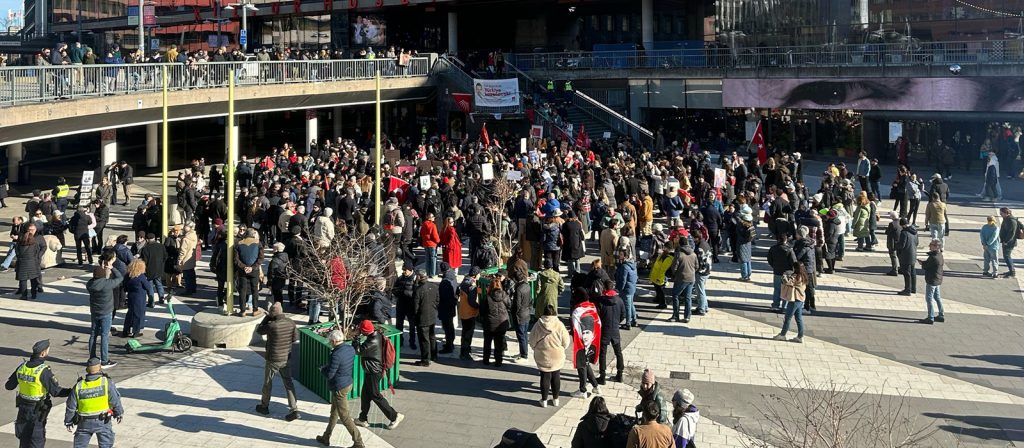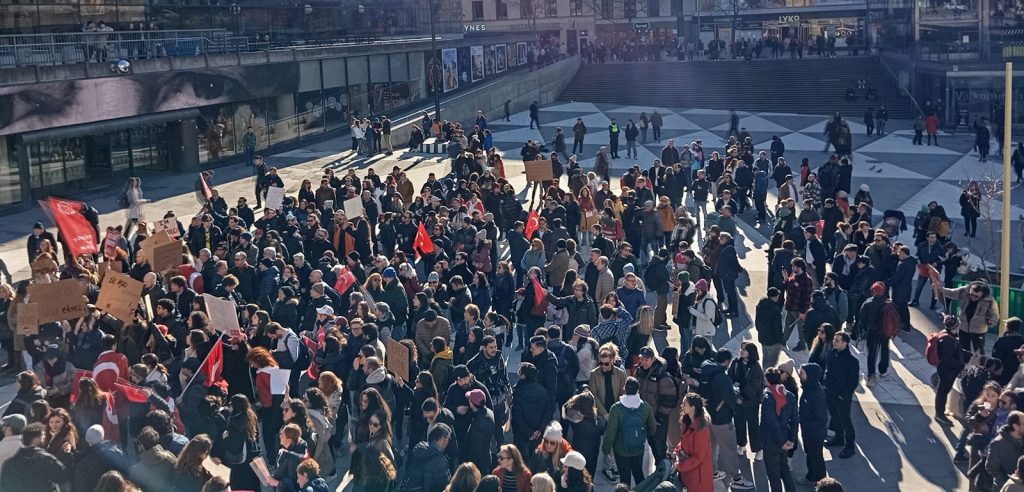Homeland elections – particularly contentious ones – can trigger uprisings among expatriate populations. But as migrants organise protests from afar, home-country governments are increasingly developing ways to push back against them. İmren Borsuk explores how dissent travels among Turkey’s emigrants, and how the Turkish regime is responding across borders
Ekrem İmamoğlu, the current mayor of Istanbul, is a popular leader who appeals to Turkey’s diverse constituencies — much like incumbent president Recep Tayyip Erdoğan of the ruling AKP party did in his earlier political career. Representing the Republican People’s Party (CHP), İmamoğlu defeated the AKP candidate to win the 2024 local elections in Istanbul.
Since his victory, İmamoğlu and his team have faced increasing political pressure and legal crackdowns. As he launched his campaign to become the CHP’s presidential candidate, these pressures escalated. Most recently, Istanbul University annulled İmamoğlu’s university diploma — a formal requirement to run for president — and he was arrested pending trial on corruption charges. Many people see this arrest as the latest move by the AKP to sideline İmamoğlu, a key challenger to President Erdoğan.
The arrest of CHP presidential candidate Ekrem İmamoğlu has sparked a new wave of opposition protests that are reverberating beyond Turkey's borders
İmamoğlu’s detention sparked a new wave of opposition protests that are reverberating beyond Turkey's borders. In early April, migrants from Turkey demonstrated in Berlin, Stockholm, and Paris. The speed and scale of this mobilisation underscore how deeply migrants remain connected to the politics of their homeland.
In Stockholm alone, five protests have erupted since İmamoğlu’s arrest. This marks a renewed phase of sustained transnational political engagement by Turkey’s expatriate communities.

Migrants often maintain close social, cultural, economic, and political ties to their countries of origin. In their host countries, they engage with the politics of their homeland by establishing community organisations, lobbying and advocacy, running political campaigns, and organising protests. The rise of external voting rights has intensified political engagement. In 1980, only 15% of countries allowed their citizens abroad to vote. This number had risen to 70% by 2017.
Migrants often maintain close political ties to their countries of origin by establishing community organisations, lobbying and advocacy, running political campaigns, and organising protests
In an era of rising global authoritarianism, homeland elections pose new challenges for migrant-sending and receiving countries. Populist authoritarian leaders use their powers of office to erode institutional checks. They undermine electoral competition and deepen social polarisation during electoral campaigns. Elections become highly contested, with partisan debates, oppositional harassment, street protests, election-related conflict, and violence. These tensions spill across borders, mobilising immigrant communities and fuelling transnational activism. This is especially likely when autocratic governments rule in migrants’ countries of origin.
According to official statistics, Turkey has 6.5 million expatriates. Among these, 5.5 million live in Western European countries. Since 2002, successive AKP governments have developed new engagement policies targeting Turkey’s emigrants. They have created institutions, narratives, and programmes all designed to engage with Turkey’s emigrants and secure their support.
Reforms in 2008 and 2012 enabled external voting in presidential and parliamentary elections, as well as referenda. Turkey's political parties now campaign abroad — offering transport to polling stations, organising rallies, and selecting candidates from migrant communities. Electoral mobilisation has become a key feature of transnational activism, diffusing the dynamics of domestic political competition across borders.
Turkish-Kurdish conflicts in Europe have often been a major focus of immigrant mobilisation. Yet since the 2010s, political competition between Turkey's ruling AKP and opposition parties has become increasingly important. The introduction of external voting rights for Turkish citizens abroad catalysed this shift. Turkey’s next presidential elections will take place in 2028, though discussions about early elections and constitutional changes to allow Erdoğan to seek another term are already underway.
İmamoğlu has defeated the candidates from the ruling AKP party three times in Istanbul: in the 2019 local elections, their re-run in June 2019, and in the 2024 local elections. İmamoğlu’s imprisonment is seen as part of AKP plans to eliminate a credible challenger to Erdoğan. The move has fuelled concerns that Turkey is sliding from an electoral autocracy towards full autocracy, where elections exist but real political competition is no longer permitted.
The protests at İmamoğlu's detention recall the 2013 Gezi Park demonstrations, which also spread to solidarity rallies in European cities. At the time, the AKP responded by organising Respect for National Will counter-rallies against protestors in Europe. Back then, Turkey's politics still preserved a veneer of democracy. The regime conducted relatively free and fair elections, which had secured Erdoğan 50% of the vote in 2011.
Despite flaws in the electoral process, the 2024 local elections revealed a significant erosion of AKP support, with opposition parties winning key cities like Istanbul and Ankara
Today, however, Erdoğan no longer enjoys that democratic legitimacy. V-Dem now categorises Turkey as an electoral autocracy, in which elections take place under restrictive and repressive conditions. Despite flaws in the electoral process, the 2024 local elections revealed a significant erosion of AKP support, with opposition parties winning key cities like Istanbul and Ankara. The country’s economic struggles, marked by inflation, currency depreciation, and rising poverty, have since then only deepened social discontent.

The international geopolitical landscape has shifted significantly since the Gezi protests. In 2013, Erdoğan faced sharp criticism from the Obama administration and EU institutions for his government's heavy-handed tactics against protesters. Erdoğan reacted to Western powers’ condemnation with counter-rallies in Europe against the Gezi protesters.
European institutions are still worried about Turkey’s creeping authoritarianism. Cooperation with Ankara on security and migration, however, remains a priority.
The second Trump administration has been more muted in its response to AKP ’s authoritarianism, even praising Erdoğan’s strongman politics. Diplomatic engagements, such as the Turkey-EU High-Level Economic Dialogue and Turkey’s continued involvement in NATO, proceed with urgency, especially given growing worries over US disengagement from Ukraine and broader regional instability. As Trump reshapes the international order, Turkey has seized the opportunity to enhance its geopolitical power as a major NATO player.
Given the government’s weakened legitimacy and rising global security concerns, Turkey has an urgent need to maintain diplomatic relations. Many may now see large pro-government rallies abroad as unnecessary — or even potentially damaging to Turkey’s fragile ties with Western allies.